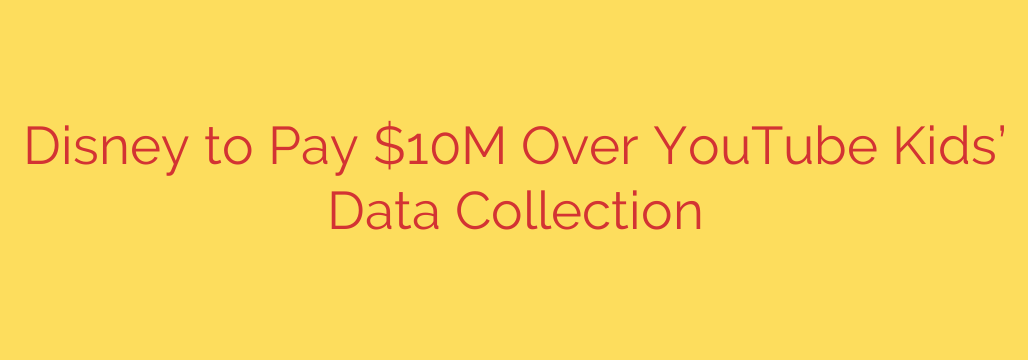
Disney Subsidiary Faces $10 Million Settlement Over Child Data Privacy Violations
In a significant development for children’s digital privacy, a subsidiary of The Walt Disney Company has agreed to a $10 million proposed settlement over allegations that it illegally collected and used the personal data of children without parental consent. The case highlights the stringent regulations governing online content for young audiences and serves as a stark reminder for all companies operating in the digital space.
The complaint, brought forward by the Federal Trade Commission (FTC) and the New York Attorney General, centered on the company’s alleged violations of the Children’s Online Privacy Protection Act (COPPA). This crucial federal law is designed to place parents in control of what information is collected from their young children online.
The Core of the Allegations
According to the legal filings, the Disney-owned company, Playdom, operated several popular gaming apps available through the YouTube Kids platform. The lawsuit alleged that these apps were collecting personal data from children under 13 through the use of persistent identifiers.
What are persistent identifiers? In simple terms, they are pieces of data, like cookies or device IDs, that can be used to track a user’s activity across different websites and apps over time. The complaint stated that the company used this data for targeted advertising, a practice strictly prohibited by COPPA unless a company obtains verifiable parental consent first.
The core of the issue was the failure to meet this legal requirement. The lawsuit claimed that the company knowingly allowed third-party ad networks to collect and use this data for commercial purposes, all without obtaining verifiable parental consent from the children’s parents. This action effectively bypassed the protective measures COPPA was created to enforce.
Why This Case Matters: Understanding COPPA
The Children’s Online Privacy Protection Act is a landmark piece of legislation that imposes specific requirements on operators of websites, apps, and online services directed at children under 13.
Key requirements of COPPA include:
- Providing clear and comprehensive notice of their data collection practices.
- Obtaining verifiable parental consent before collecting, using, or disclosing personal information from children.
- Allowing parents the right to review and delete their child’s personal information.
This case serves as a clear warning to all app developers and content creators, especially those on platforms like YouTube Kids. Regulators are actively monitoring the digital landscape to ensure companies are not prioritizing profits over the privacy and safety of their youngest users.
How to Protect Your Child’s Online Privacy
This news can be unsettling for parents, but it underscores the importance of being proactive. Here are several actionable steps you can take to safeguard your child’s digital footprint:
- Review App Permissions: Before downloading any new app or game for your child, carefully review the permissions it requests. If an app asks for access to contacts, location, or other sensitive data that seems unnecessary for its function, it’s a major red flag.
- Utilize Parental Controls and Privacy Settings: Most devices, web browsers, and platforms like YouTube Kids have built-in parental controls. Take the time to explore and configure these settings to limit data collection, restrict content, and manage screen time.
- Read Privacy Policies: While they can be lengthy, the privacy policy of an app will tell you exactly what data is collected and how it is used. Look for sections specifically addressing children’s privacy and COPPA compliance.
- Educate Your Child: Teach your children the importance of not sharing personal information online, such as their full name, school, or address. Foster an open dialogue where they feel comfortable coming to you with any questions or concerns about their online experiences.
Ultimately, this settlement is more than just a financial penalty; it’s a powerful statement on the non-negotiable importance of protecting children in the digital age. As technology continues to evolve, the principles of privacy and consent must remain at the forefront for creators, platforms, and parents alike.
Source: https://www.bleepingcomputer.com/news/security/disney-to-pay-10m-to-settle-claims-it-collected-kids-data-on-youtube/








